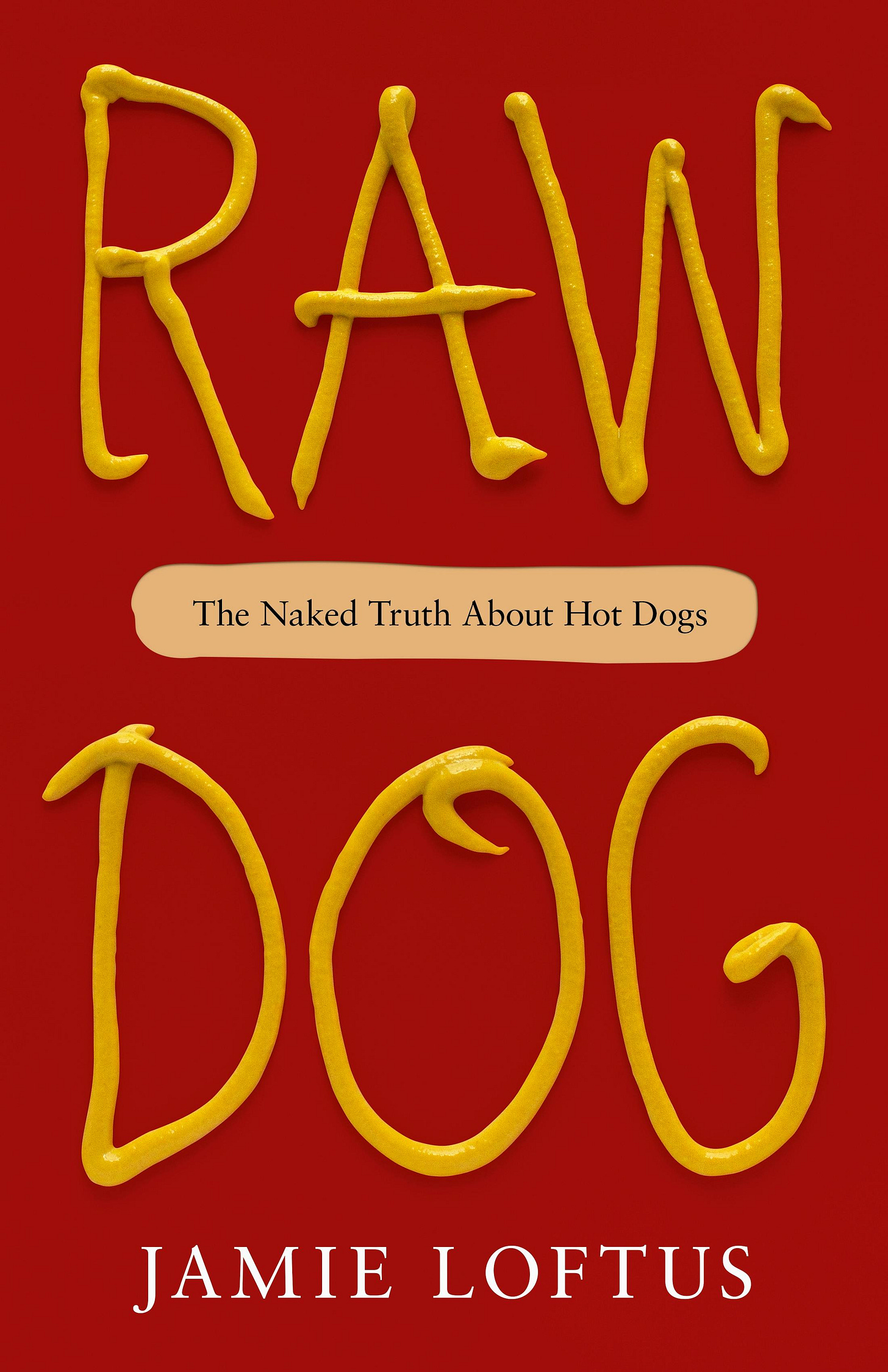At its annual meeting in Philadelphia last Friday, the American Dialect Society, which has been selecting words of the year for 35 years, selected rawdog as its word of the year for 2024.
Not this raw dog:

No, a very different, single-word rawdog.
From the ADS press release:
The verb rawdog is defined as “to undertake without usual protection, preparation, or comfort.” While the word originated as a vulgar slang term referring to having sex without a condom, rawdogging ended up crossing over into mainstream usage for a wide variety of activities, like the travel trend in which a passenger sits through a flight without any distractions.
The Linguistic Society of America, the ADS’s sister organization, added context:
Whether it’s diving into a challenge unprepared or skipping the safety net, rawdogging is about embracing risk, stone-cold sobriety, and rolling with it.
I’d been aware of the rawdogging travel fad — I wouldn’t call it a trend, exactly — and I’d read Mededitor’s October post on the Strong Language blog about the term’s new connotations. But I hadn’t included rawdog among my own words of the year because, frankly, it struck me as a passing fancy, not unlike hawk tuah and demure (both of which were nominated in the ADS “Fun While It Lasted” category).1 I was surprised at first that rawdog was embraced so enthusiastically by the 300 or so ADS attendees as the word of the year for 2024.
And then, on reflection, not so surprised.
After all, two years ago this same august body chose -ussy as its word of the year. And in its very first vote, in January 1991, it selected Bushlips. Remember those words? No?
The ADS, in other words, has its own idiosyncratic take on what makes a word a WOTY. As I wrote in January 2023 (gift link):
I have twice been in the room where it happened, at the ADS’s annual conference, and I’m here to tell you that neither occasion was a hushed and solemn affair. On the contrary, the selection sessions are more like boisterous town meetings where a couple hundred townsfolk can’t wait to proclaim their fervently held convictions. The sessions are held in large conference rooms; most attendees are graduate students in linguistics or recent PhDs, which means the majority are in their 20s and early 30s. . . . The attendees are impassioned, they’re witty, and they’re loud. They’re savvy about things I know little about: syntax trees, phrasal templates, TikTok. More than once I witnessed a single eloquent speaker sway the prevailing mood and change the vote.
In other words, it’s hardly a rigorous, data-driven approach.2
Rawdog fits neatly within ADS criteria and preferences. It’s an old term that’s undergone semantic shift. It was newly prominent in the previous twelve months. And, maybe most important, it’s edgy — this group lives to provoke — and not only because of the smut factor.
Indeed, the most amusing part of the rawdog selection, for me at least, was the outraged response on social media (OK, just Bluesky, because that’s where I was following along). People were annoyed, but not because rawdog had a naughty meaning. Nope: They were annoyed because it had a new, non-naughty meaning. A word that they had assumed meant one thing was now purported to mean something else! Was that even allowed? “Wait, do you know what this actually meant?” “It’s literally fucking without a condom.” “And you call yourselves linguists?”
And there was this lament, which to be fair is a good indication of rawdog’s, um, penetration:
Linguist Caitlin M. Green patiently defended the rawdog choice to the skeptics:
So what’s the real rawdog story? It’s more complex — and older — than I’d thought.
The earliest citation for raw dog “sex without a condom” is a July 9, 2002, Urban Dictionary entry. By 2012 the word a gained a nonsexual sense: “To go into an exam, quiz, or test without studying enough (or at all) beforehand.” And in 2022 Urban Dictionary had this entry: “To perform any act recklessly or without preparation. A semantic broadening of the original sense of unprotected intercourse based on connotations of risk.”
Last July,
, aka Etymology Nerd, told the New York Times (gift link) that he’d first noticed the shift in meaning in 2019 or 2020. “It’s always been funny to use sex words in non sex situations, and we have been doing that forever,” he said. The term has become a dysphemism, he added: the opposite of a euphemism. Tiktok failed to load.
Tiktok failed to load.Enable 3rd party cookies or use another browser
But when I consulted my favorite slang resource,
’s esteemed Dictionary of Slang, I discovered that raw dog had an even longer pedigree.Here’s how it was defined in Central Slang: A Police Officer’s Training Guide, published in Long Beach, California, in 1985:
T.R. Houser Central Sl. 44: raw dog To treat someone worse than a dog. To bring cruel abuse and heartless harm to bear.
From the relatively innocuous, non-sex sense of “to treat someone badly,” raw dog — eventually rawdog — evolved, or devolved, into “unprotected sex” and then into “any reckless or undaunted behavior,” which earned it a WOTY prize.
It turns out to be relatively easy to teach an old rawdog new tricks.
A few words about the Los Angeles fires
I live in the Bay Area now, but I’m an Angeleno: born in downtown Los Angeles; graduated from Los Angeles High School, the oldest public high school in Southern California. Which means I’ve been alert to fire for as long as I can remember. The first time I went to sleepaway camp, in Malibu, the counselors put us campers to work planting fire-resistant ice plants on hillsides ravaged the previous September by the most recent wildfire. Was this unpaid labor supposed to be fun? Character-building? I don’t know. I was 9.
In October 1991 I was living in Oakland. Downstairs, in our four-unit building, I had a neighbor whose brother died trying to save his house from the Oakland Hills firestorm. In my memory I still hear her agonized howls of grief; I’d never heard anyone wail like that. I also remember the acrid stench of burned metal and vaporized car upholstery — and much grislier substances — that lingered for weeks throughout the city.
Sixty or so miles north of here, friends have had to evacuate their Santa Rosa house three times in recent years because of fires. One of those fires spared their house by just a few meters.
Which is to say: I’ve never not lived with fire, or the threat of fire.
But all of those fires were, in their grim way, predictable. They arrived in September or October, after six or seven dry months, when the air was scorching and the Santa Ana winds — we call them Diablo winds up here — turned brush into kindling.
Wildfires in January, though: That’s a new, not-normal horror. We’re supposed to be preparing for floods in January, not fires.
My own words feel inadequate, and you already know about donations. (If not, read this.) Here are some links to writing I’ve found helpful, thoughtful, or moving:
San Francisco Standard, “A Bay Area fire tracking app is saving lives in L.A. — and clapping back at Elon Musk.” The story of Watch Duty.
, a writer I’ve followed since her years as a Los Angeles Times columnist, on losing her Altadena house: “What We’ve Lost in the Los Angeles Wildfires.”Xochitl Gonzalez, “Altadena After the Fire” (The Atlantic gift link; this one goes out especially to my Altadena friends P. and B.):
, “The Fire This Time”:The local economy was also exactly that: local. Minus a few fast-food joints and big chain pharmacies, the neighborhood was as close to mom-and-pop as one can find today. For 25 years, kids from Altadena and Pasadena have studied with Sipoo Shelene Hearring at Two Dragons Martial Arts. Locals who met at the Rancho, Altadena’s premiere dive bar, became so close that they were known to spend holidays together. If you were bored, you could take your family to the Bunny Museum and browse more than 30,000 items of collectible rabbit memorabilia.
Every single one of those businesses burned to the ground this week.
I’ve always thought if the moment really arose, I’d snap to it and immediately know what I’d take, but here I was, in the moment, and I blanked out. I packed pajamas, a warm sweater that I don’t really like, and a shirt that I do. Then I couldn’t make my brain work. I always thought I would stuff all my favorite clothes in my bag, or my other jewelry, or a few decorative objects that are sentimental, but I couldn’t do it; I was numb.
For the record, I still think broligarchy or slop would have been a more accurate representation of the overall tenor of 2024 and beyond.
For a closer look at this year’s ADS selection process, see Dave Wilton’s Word Origins newsletter.





I'm no expert, but my guess is that the earlier meaning recorded by Green is an unrelated separate invention.
I apologize in advance for my crude sense of humor, but when you quoted, “Wait, do you know what this actually meant?” “It’s literally fucking without a condom.” “And you call yourselves linguists?” I couldn’t believe that in the last line the author completely missed the opportunity to add the adjective “cunning” before “linguists.” #justsaying